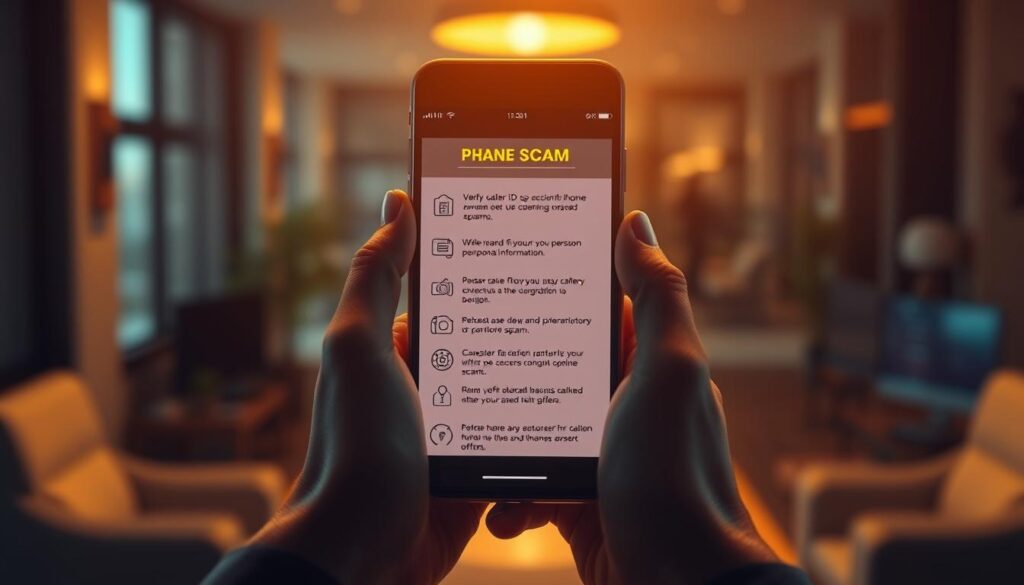The threat of hacker scams through phone calls is growing fast. It affects both people and businesses. The Federal Trade Commission says over $12.5 billion was lost to scams in 2024. Bank scams, cryptocurrency scams, and investment scams are the top types.
Scammers try to get your sensitive info or access your systems. Knowing their tricks is key to staying safe. This article will dive into hacker scams and how to spot and dodge them.
Www.TheComputerTechSquad.com wrote this to teach you about phone scam hackers. It also shows how to reduce your risk.
Understanding Hacker Scams
To avoid falling victim to hacker scams, it’s crucial to know how they work. These scams involve fraud where people or groups trick victims into sharing sensitive info or doing actions that risk their security. Experts from Www.TheComputerTechSquad.com say staying informed is key to preventing such scams.
Scammers often try to rush people into acting without giving them enough info. Legitimate organizations never pressure customers to make hasty decisions. Knowing these tactics helps you protect yourself from phone scam alerts.
To prevent phone scams, it’s important to know the common tactics scammers use. Be careful with unsolicited calls and never share personal or financial info over the phone unless you’re sure who’s calling. Learning how to prevent phone scams means staying alert and informed.
By being informed and cautious, you can lower the risk of falling victim to hacker scams. Remember, prevention is key. Knowing the latest scam tactics is the first step in keeping yourself safe.
Common Types of Phone Call Scams
Phone scams come in many forms, with some appearing more often. Knowing about these scams is key to avoiding hacker phone calls and other frauds.
Scammers use tricks to gain your trust or scare you. For example, tech support scams claim to be from companies like Microsoft. They say your computer has a virus and ask for money to fix it.
IRS impersonation scams are also common. Scammers pretend to be IRS agents, threatening arrest or legal trouble for unpaid taxes. Remember, the IRS usually contacts you by mail, not by surprise phone call.
Prize or lottery scams trick victims into thinking they’ve won big. They’re told to pay a fee or taxes to get their prize. Real lotteries and contests never ask for money to claim a prize.

Learning about these scams is a big step in phone scam prevention. Being informed helps protect you from these scams.
Summary of Common Phone Scams
| Scam Type | Description | Prevention Tip |
|---|---|---|
| Tech Support Scam | Scammers claim to be from tech companies, stating the victim’s computer is infected. | Verify the caller’s identity; tech companies won’t call to fix computers. |
| IRS Impersonation Scam | Scammers pose as IRS agents, demanding back taxes. | Be wary of unsolicited calls; IRS communicates through official mail. |
| Prize or Lottery Scam | Victims are told they’ve won a prize but must pay a fee to claim it. | Never pay to claim a prize; legitimate contests don’t require upfront fees. |
Prepared by Www.TheComputerTechSquad.com.
Recognizing the Signs of a Scam
Knowing how to spot a scam is key to staying safe. Legit companies never ask for your personal or financial details over the phone. So, be cautious if someone calls asking for this info.
Scammers often act strangely, like being too aggressive or evasive. They might also try to rush you into making a payment or giving out sensitive info.

| Signs of a Scam | Legitimate Call Characteristics |
|---|---|
| Requesting personal or financial information | Verifying caller identity through official channels |
| Being overly aggressive or evasive | Providing clear and concise information |
| Pressuring for immediate action | Giving reasonable time to respond or act |
Prepared by Www.TheComputerTechSquad.com, your partner in cyber security phone scam protection.
How Scammers Use Social Engineering
Learning about social engineering tactics used by scammers is crucial for staying safe from phone scams. Scammers trick people into sharing personal info or doing certain actions. They might get this info through phishing emails or calls.
Scammers create a sense of urgency to make victims act fast. This makes it hard for them to think things through. They often mix this with other tricks to confuse people.
Common Social Engineering Tactics Used by Scammers:
- Creating a false sense of urgency to prompt immediate action
- Gathering personal information through phishing emails or phone calls
- Impersonating legitimate organizations or authorities
Scammers try to build trust by pretending to be from banks or government agencies. They ask for sensitive info.
Here’s a breakdown of how scammers use social engineering tactics:
| Tactic | Description | Example |
|---|---|---|
| Urgency | Creating a sense of urgency to prompt action | “Your account will be locked if you don’t confirm your details now.” |
| Impersonation | Impersonating legitimate organizations | Claiming to be from a bank or government agency |
| Information Gathering | Gathering personal information through phishing | Sending emails or making calls that ask for sensitive information |

Knowing these tactics can help you avoid phone scams. Always be careful and check if calls or emails are real before sharing info.
Prepared by Www.TheComputerTechSquad.com, this info aims to educate and protect individuals from falling prey to hacker scams through phone calls.
Protecting Yourself from Phone Scams
In today’s world, it’s crucial to know how to avoid phone scams. Phone scam hackers are getting smarter. So, it’s important to stay up-to-date with their tricks.
One good way to protect yourself is by using call-blocking features. This can help block many scam calls. Also, never give out personal or financial info over the phone unless you’re sure it’s safe.
Key Steps to Protect Yourself:
- Use call-blocking apps to filter out suspicious calls.
- Be cautious with unsolicited calls asking for personal or financial information.
- Verify the identity of callers claiming to be from legitimate companies.
Real companies, like banks and government agencies, won’t ask for your passwords or Social Security number over the phone. If someone claiming to be from these places asks for this info, it’s a scam warning sign.
| Scam Indicator | Legitimate Call |
|---|---|
| Requesting sensitive information | Never asks for passwords or SSN |
| Threatening or creating a sense of urgency | Professional and courteous communication |
| Unknown or unverified caller ID | Verified caller ID or callback number |
By knowing these signs and taking steps to protect yourself, you can lower your risk of falling for phone scams. Being informed and careful is the best way to keep your personal and financial info safe.

What to Do If You Receive a Suspicious Call
When you get a suspicious call, acting fast is important. The first thing to do is hang up immediately. Talking to the caller can make things worse.
After hanging up, you should report the call to the right people. In the U.S., you can tell the Federal Trade Commission (FTC). Reporting helps catch scammers and stops more scams.
- Block the number if your phone allows it.
- Be careful with your personal info; don’t share it on unsolicited calls.
- Tell your friends and family about the scam to warn them.
By doing these things, you protect yourself and help others too. Being alert and informed is crucial to preventing phone scams. It also helps you avoid hacker phone calls and other scams.
Prepared by Www.TheComputerTechSquad.com.
The Role of Telecommunication Companies
Telecommunication companies play a big role in stopping phone scams today. They do more than just carry calls. They actively work to keep their customers safe from scam calls.
One key way they help is by offering call-blocking features. These features let people block unwanted calls. This means fewer scam calls reach their phones. Many companies also block known scam numbers, adding extra protection.
These companies also team up with law enforcement agencies to fight phone scams. They share info on scam calls and work together to stop scams. This teamwork is key to keeping up with scammers who keep changing their tricks.
Some important steps these companies are taking include:
- Using new call authentication tech to check if calls are real.
- Letting customers choose how to block calls based on their needs.
- Keeping their systems updated to fight new scam tactics.
The Federal Communications Commission (FCC) says, “Telecommunication companies must protect their customers from scams. They must also work with regulators and law enforcement to stop scam calls.” This shows how important these companies are in the fight against phone scams.
As Www.TheComputerTechSquad.com points out, telecommunication companies are key in stopping phone scams. They do this through call-blocking features and working with law enforcement. By always improving and adapting, they can better protect people from scams.
Legal Consequences of Phone Scamming
Phone scams can lead to serious legal trouble. This includes big fines and even jail time. These actions break federal laws meant to keep consumers safe from scams.
Federal Laws Against Scamming
There are tough federal laws against phone scams. These laws let authorities fine and jail scammers heavily.
“The law takes a stern view of phone scamming, and those caught face severe penalties.”
Phone scams are a big problem, with thousands losing money each year. The Federal Trade Commission (FTC) works hard to catch and punish scammers.
Scammers can get fines up to $10,000 or more. They might also go to jail. The jail time depends on how big the scam was.
For example, someone running a big scam could get years in jail. The law aims to stop these crimes and protect people.
Prepared by Www.TheComputerTechSquad.com.
Resources for Consumers
Many resources help protect people from phone scams. The Federal Trade Commission (FTC) and the Better Business Bureau (BBB) are key. They offer tips to avoid scams.
The FTC has lots of info on its site. It includes complaint forms and educational materials. The BBB lets you report scams and file complaints too.
There are more tools to fight phone scams. Many phone companies offer ways to block or spot suspicious calls.
Using these resources can lower your risk of getting scammed. It’s important to stay informed and protect yourself.
Prepared by Www.TheComputerTechSquad.com.
Staying Informed About New Scams
To avoid phone scams, it’s important to know the latest scam alerts and tactics. Experts at Www.TheComputerTechSquad.com say staying alert is crucial.
Staying informed is crucial in preventing phone scams. Follow trusted news and join groups to stay updated. A cybersecurity expert says, “The best defense against phone scams is a well-informed public.”
“Scammers are constantly evolving their tactics, making it essential for consumers to stay informed and cautious when receiving unsolicited calls.”
To stay informed, consumers can take the following steps:
- Follow news outlets that report on the latest scam tactics
- Join community awareness groups to stay updated on local scams
- Register on the National Do Not Call Registry to reduce unwanted calls
By following these steps, you can lower your risk of falling for phone scams. Remember, knowing what’s going on is the first step to protecting yourself.
Encouraging Discussions with Family and Friends
Stopping phone scams needs everyone’s help. Talking to family and friends about these scams is a big step. It helps keep others safe from falling into scams.
Sharing your own experiences and teaching others about new scams is key. When you talk about phone scams, make sure to warn about hacker calls. Also, share tips on how to avoid scams.
Together, we can make our community safer from phone scams. For more tips on staying safe, check out TheComputerTechSquad.com.


